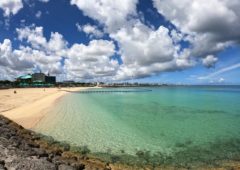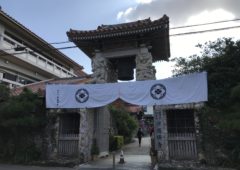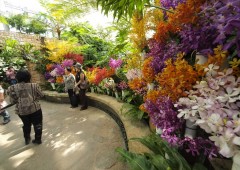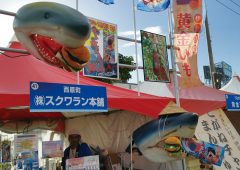2013.07.19
Security through environmental symbiosis in Henoko
By Zak Kulberg
Economic growth that slowly seduces away the coral, the sea grass, and the forest, is a core of conflict more threatening than any war. Many of the international grievances that aggravate nations are caused by polluted water, shadelessness, and populations divorced from the fruits of the earth. This is my view, which is almost completely uninformed. Little can be said about the plans at Henoko. It is time we cooperate internationally to grow back the nature that older generations fondly remember. The investment of our love, our time, and our resources today will guide our returns in the future. “We must cultivate our garden…” – not destroy nature.
The top of all armed forces hierarchies is permanently governed by ecology. Our soils and our ocean deserve the work hours, money and attention that are swallowed in conflict paradigms. The effort that goes into shipping materials to landfill and build for militaries needs to be scaled with the environment. Instead of dumping millions of truckloads of landfill to kill marine life, we should be shipping millions of truckloads of compost to reforest degraded landscapes for capturing greenhouse gases. “What ifs” and political tollbooths are standing between best judgments and actions.
What is the role of military assistance for ecological restoration? Reversing the depletion of sea and land health are appropriate tasks for this generation. Climate change is the global conflict. We need armies rebuilding ecosystems to counteract energy expenditure. This generation of children needs to witness bold lessons about restoring the environment. Urban sprawl is capturing more youth, continually distracted with bank vault architecture, airstrips, highways, and electronic devices. Children are gradually escaping the inspiration of birds and reef fish.
Building development, which destroys forest cover and coral habitat, is coupled to an increasing dissociation from nature and indigenous human cultures. We constantly bear the branding of new roads, hotels and military activity. We cannot proceed with the environmental negligence that has led us to our current state of dwindling ocean life. Reducing the impact of development is not progressive enough to counteract damages already done. Each road and building carved from nature slowly strips the earth of more dignity. Despite the security, seawalls are not the same as the original coastlines.
People fall in love with the beautiful Okinawa. It kindles the desires of people to live with and in nature. The direct reliance on the natural state of the land and sea is under-represented and declining. It is essential to nurture the people that live from the land. Let pristine places in Okinawa remain pristine. Above preservation, Okinawans and foreigners could join hands more often to share resources for coral reef restoration.
Okinawan people understand the importance of sea farming. Developing international field research sites for sea farming is a sustainable priority to construction work without environmental returns. Bankers and investors should understand this. Research clusters can be developed in the interest of MAFF and JICA. The UN affiliates that use the Futenma base should understand the importance of this too. Coastal restoration, offsetting the carbon emissions of cement factories and petroleum based industries, and trading natural products… these are leading interests.
Peaceful relations should be based on templates for international food, water and energy security. Building sea farms with recycled building materials, generating sustainable energy with wind, solar power, and ocean turbines… these are endorsable activities. Security is a symbiosis, not a conflict.

 2024.04.10
2024.04.10 2024.01.31
2024.01.31 2024.01.02
2024.01.02 2023.12.27
2023.12.27 2023.11.16
2023.11.16 2023.11.14
2023.11.14 2023.11.10
2023.11.10 2023.10.26
2023.10.26 2023.10.16
2023.10.16 2023.09.14
2023.09.14






